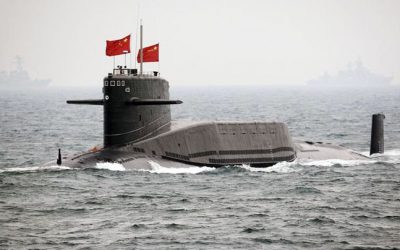Why Is India Bragging About Allegedly Tracking a Chinese Submarine in the Indian Ocean?

India is sending several messages by bragging about its alleged ability to track one of its “frenemy’s” submarines in the “Indian Ocean”, though the timing of this announcement might inadvertently raise further suspicions in Russia about its South Asian partner’s true long-term strategic intentions.
Sputnik reported that Indian Navy Chief Admiral Sunil Lanba just disclosed during a press conference on Monday that his country had secretly tracked a Chinese submarine in the “Indian Ocean” in October, which sent several important messages irrespective if his claims are true or not:
The “Indian Ocean” Is Hegemonically Regarded By India As Its “Backyard”
India considers one of the world’s largest bodies of water to be exclusively within its “sphere of influence”, giving it the self-proclaimed “right” to supposedly track foreign submarines that traverse through the tens of millions of square miles of international waters here in a thinly disguised hegemonic message meant to convey its aspirations as a rising Great Power.
India’s American Ally Might Have Lent A Helping Hand
Supposing that a Chinese submarine did indeed enter the “Indian Ocean” during October and was tracked the entire time, it’s very likely that India was able to do this only through the help of its new American ally via the working channels between their two militaries that were recently established through the Communications, Compatibility and Security Agreement (COMCASA) that was finally agreed to in early September.
New Delhi’s Naval Capabilities Are Much Better Than Previously Thought
Considering that the “Indian Ocean Region” is expected to become the geostrategic center of gravity in the New Cold War, India has an interest in deceptively portraying its naval capabilities as being much better than previously thought, both in order to “deter” China but also to prove its military-strategic “value” to the US in the face of rising skepticism at home about its role in this alliance.
The BJP Isn’t “Going Soft” On China Ahead Of General Elections Next May
Practically every domestic and international political development concerning India nowadays must be seen through the prism of next May’s general elections, meaning that the ruling BJP is also signaling to its supporters that it isn’t “going soft” on China despite the faux ‘rapprochement’ that it’s partaking in with its “frenemy” as part of a deal for both of them to increase their respective negotiating leverage vis-à-vis the US.
India Doesn’t Care How Russia Interprets Its Statement
It says a lot that India would make this announcement just days after Admiral Lanba returned from Russia and at the same time as his country’s Eurasian partner is holding joint naval drills with Pakistan, strongly suggesting that New Delhi doesn’t care how Moscow interprets the pro-American and anti-Chinese messages that it conveyed because India sees itself as much closer to the US than Russia in the military-strategic sense.
*
Note to readers: please click the share buttons above. Forward this article to your email lists. Crosspost on your blog site, internet forums. etc.
This article was originally published on Eurasia Future.
Andrew Korybko is an American Moscow-based political analyst specializing in the relationship between the US strategy in Afro-Eurasia, China’s One Belt One Road global vision of New Silk Road connectivity, and Hybrid Warfare. He is a frequent contributor to Global Research.
Featured image is from India Today

